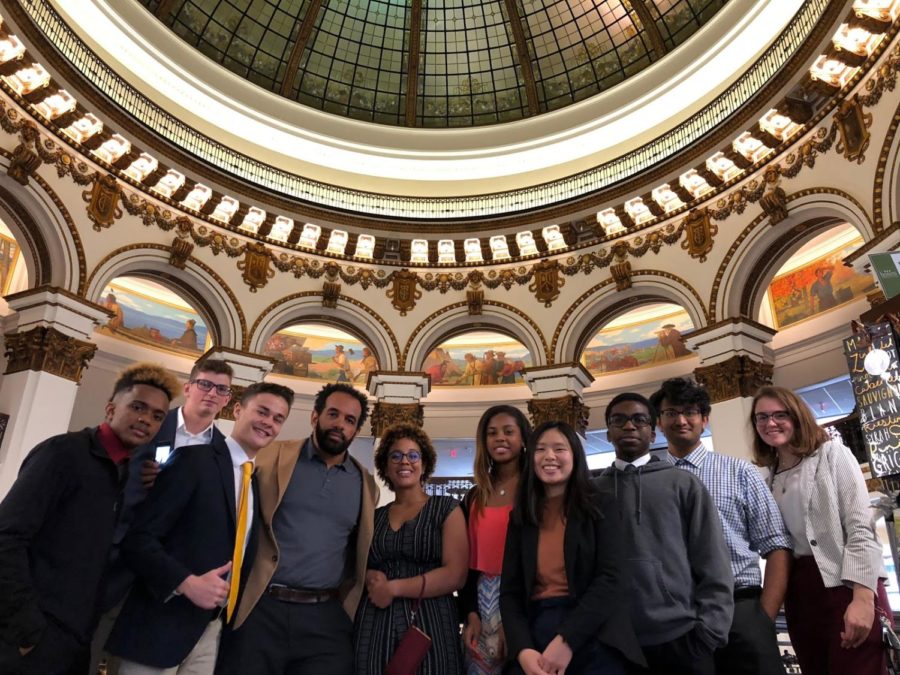City Club challenges students to interact and learn
Some of the SHS attendees for Rep. Ro Khanna’s forum. From left to right: Antonio Jones, Evan Johnson, Leo Lyublinski, Aaron Jeter, Kaitlyn Thompson, Jayla McCoy, Sandy Shen, Samuel (Sam) Oguntoyinbo, Neel Mehta and Kayla Arenschield. Photo taken by Melissa Ellin at the Heinen’s in downtown Cleveland.
October 30, 2018
The City Club of Cleveland (City Club), a free speech forum, has invited people to watch and ask questions to powerful speakers and leaders since 1912. Solon High School (SHS) History teacher Aaron Jeter has been taking SHS students to these forums for about three years now. The most recent field trip to City Club was to see Silicon Valley Rep. Ro Khanna’s forum titled “Jobs for all? Disruption and the future or work.” In it, Khanna discussed technology’s effects on the workforce, and the changes he believes need to be made including, but not limited to, the addition of coding as a core class for high schoolers.
Just how did these field trips begin?
A simple conversation.
“I met a female corporate attorney at a function years ago and she said the only thing she really remembered from high school was her teacher taking her to see and hear dynamic speakers at the City Club and that really stuck with me,” Jeter said.
Since then, Jeter has been taking small groups of students (10-15) to City Club about once every quarter. Jeter, and one motivated senior he appoints as a student organizer, each pick approximately five students to go on every field trip. Jeter said he selects his students based on their work ethic.
“…I choose… students I know who seemed to demonstrate an overall curiosity for life and learning, and [are] not just concerned with their grade.”
This year’s senior organizer, Sandy Shen, said she chooses students based on whether she thinks they’ll interact with the material. Shen said she believes smaller groups ensure participation.
“I do think you limit the amount of access people have to these kinds of political forums, but at the same time you also want to make sure that the audience [will participate]…” Shen said. “So, I want to choose people that are actually interested in this kind of discussion.”
Jeter said he had a specific interest in seeing Khanna speak because he feels Khanna’s policies are relevant.
“I especially wanted to take kids to see Khanna because he is [a] new Congressman with a lot of innovative ideas about changing the national conversation away from our petty differences to pragmatic solutions in respect to the future of jobs and our changing economy,” Jeter said.
At the forum, SHS senior Kayla Arenschield, senior Leo Lyublinski and Jeter asked the congressman questions regarding his stance on technology and employment. Jeter said the ability to ask questions while in front of an audience of strangers is something City Club helps students with. Jeter said he sees a greater value in City Club than simply learning about policies.
“I always like the part at City Club when the President says, ‘if there is anyone you don’t know at your table, please introduce yourself,’” Jeter said. “Those soft interpersonal skills need to be developed early and often and I think The City Club provides the perfect venue for that.”
Additionally, Shen said she believes the purpose of City Club is to learn. Whether it’s from the speaker’s example of effective presentation, or content discussed.
“I’ve gotten great book recommendations [from City Club], but I’ve also learned about how many different layers there are to articulating your actual argument itself,” Shen said. “As a speaker… you learn by watching them, how they present themselves and how they unleash everything. I’ve also learned a lot about policy, and how it really, heavily depends on people working together and being able to fully communicate their ideas…”
At Khanna’s forum he discussed many different concepts. He expressed his interest in ensuring students learn technology as part of their core curriculum because he believes the future of work lies in technology. Whether people are designing technology, repairing it or using it, he said that while machines may take some jobs from people, more jobs will be created because the there will be a necessity for people that understand how to use them. Arenschield admitted she saw merit in Khanna’s ideology, but she wasn’t entirely convinced.
“I’m on the fence,” Arenschield said. “I understand the importance of STEM education in an increasingly digital world. I disagree that entirely STEM-focused education is the way to go because I personally see a lot of value in the humanities. I also don’t think that there will be an abundance of these jobs because of artificial intelligence, and I disagree that people from traditional rural communities will embrace this with open arms.”
If you’re interested in hearing Khanna’s forum, you can watch it here. If you want to know more about City Club, you can look at their website, or contact Shen at [email protected].

